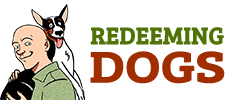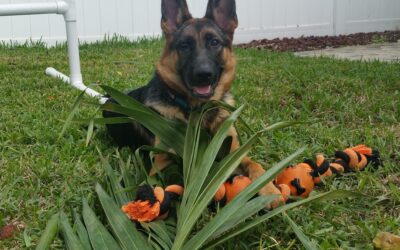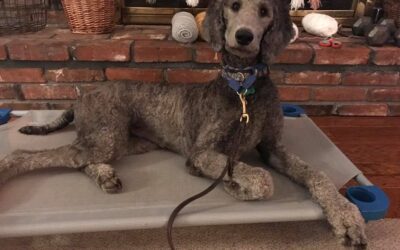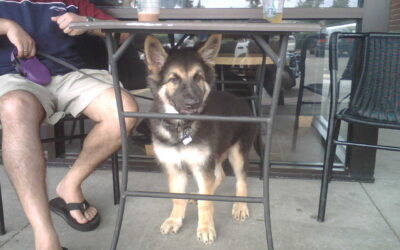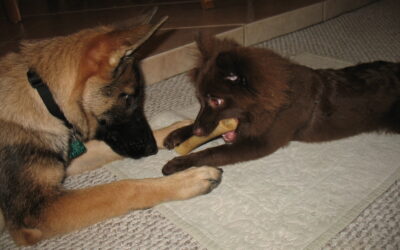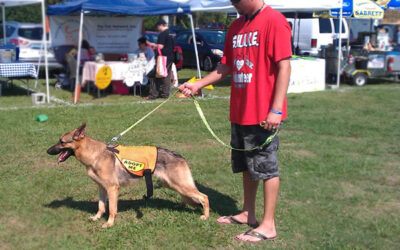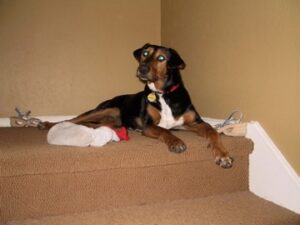 A very common thing I see when working with clients is a dog that was obtained as an adult, and likes the existing animals/people in the house, but does not like new people or dogs introduced later – sometimes attacking them with extreme prejudice. The owners are really surprised and frustrated because when the dog was newly arrived it got along fine with everyone at the house, even dogs on walks and in other places. When they saw the dog in the original location (when they met it) the dog was totally open to new people and dogs. What happened soon afterwards though was that the dog stopped being OK with these new individuals. Here’s what I think is happening in that situation, and what I would do about it.
A very common thing I see when working with clients is a dog that was obtained as an adult, and likes the existing animals/people in the house, but does not like new people or dogs introduced later – sometimes attacking them with extreme prejudice. The owners are really surprised and frustrated because when the dog was newly arrived it got along fine with everyone at the house, even dogs on walks and in other places. When they saw the dog in the original location (when they met it) the dog was totally open to new people and dogs. What happened soon afterwards though was that the dog stopped being OK with these new individuals. Here’s what I think is happening in that situation, and what I would do about it.
When a dog is moved from a familiar setting/group, it often goes through kind of a shock. It is trying to adapt. We often see a reduced level of activity (dog seems relaxed almost lethargic), or maybe anxiety and excessive activity (panting, furtive looks about, eye rolling), in general the dog is behaving in a way inconsistent with how it is when not displaced. These non typical behaviors will be a lot more exaggerated by a dog in a shelter setting, and far less so in a foster home setting. In fact if the dog has been in a foster home a month or so you will be able to get a very accurate read of the dog’s true nature.
If you need a Dog Trainer in the Dallas area, contact us!
As time goes on (might be 24 hours for some dogs, might be a month or two for others) it then becomes comfortable within its new environment, and decides the humans/dogs surrounding it now are the new group. Now… if the dog had behavior issues (poor socialization in puppy socialization window from birth to 4 months old) with strange dogs and people that issue will resurface big time, because the dog is back to a definition of the world of ‘us’ and ‘them’, and in the dog’s mind the teams have been picked. If the dog was given signals in the new household that it is a high status dog (allowed to control activities, space, and resources, all things frequently allowed with a new ‘rescue’ dog that people feel sorry for) these boundaries about who is acceptable may be enforced in very dramatic ways, and will include corrections (read ‘corrections’ as nastiness) issued to lower status members WITHIN the group too, both human and canine.
So… what do we do? Well, if we understand this phenomena we make sure new dogs coming in aren’t given status by being allowed to control activities, space and resources, and we don’t fuss over them. That will reduce the amount of snarkiness that is purely social climbing. The other thing we do is take advantage of that transplant shock to expose the dog to a TON of new experience, locations, and people and dogs, trying to get the dog’s new reset level to contain a huge population and territory as the new ‘normal’.
If that ship has sailed, and your new adult dog is not good with new people or dogs, we can still make changes, but they will come slower. That is something I can help you with, or any effective dog trainer can help you with. I would suggest a trainer affiliated with the International Association of Canine Professionals (IACP).
